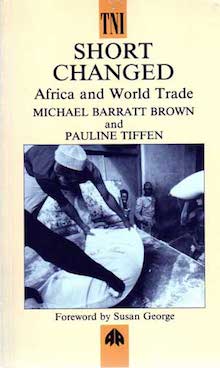
Library
Michael Barratt Brown & Pauline Tiffen
Short Changed. Africa and World Trade
Pluto Press & Transnational Institute. London — Boulder, Colorado. 1992. 220 pages
Contents
|
 |
1. Africa in Crisis
- Falling Living Standards
- Debt, Drought and War
2. The Official Response
- Structural Adjustment Programmes
- Export-led Growth
- Korean Paradigm: a Model for Africa?
3. Africa’s Resources
- Concentration of Africa’s Resources
- Foreign Trade
- Dependence
4. What Future for Export Crops?
- Declining Markets
- Falling Terms of Trade
- Substitutes from Biotechnology
- Income Demand
- Elasticities
- Future Prospects
5. Which Cash Crops?
- Coffee
- Cocoa
- Palm Oil and Groundnut Oil
- Sugar and Sweeteners
- Timber
- Fishery Products
- Live Animals, Meat, Hides and Skins
- Tobacco
- Tea
- Cotton and Textiles
- Rubber
- Other Agricultural Products
6. Africa’s Mineral Wealth
- Copper Diamonds and Gold
- Aluminium from Bauxite
- Iron and Steel
- ‘Exotic’ Minerals
7. Africa’s Fuel and Energy Resources
- Oil Refining
- Predicting Future Demand
8. What does Africa get out of its Trade?
- Sugar
- Cocoa
- Coffee
- Tea
- Tobacco
- Minerals and Transnational Control
9. African Manufactured Exports
- Oil
- Coffee
- Copper
- Diamonds
- Cocoa
- Timber
- Cane Sugar
- Meat and Live
- Animals
- Cotton
- Iron Ore
- Lack of Foreign Investment
- First World Protection
10. Export-led Growth and African Politics
- Internal Problems
- Rent Seeking by Governments
- Commodity-based Development?
- Foreign Investment in Africa Checked
- Failure of Structural Adjustment
References
Short Changed is a detailed and devastating critique of the economic strategies which the International Monetary Fund and the World Bank have imposed on African countries.
In return for some limited rescheduling of debts, African governments have been forced to remove controls over trade and foreign exhange to increase exports of their primary commodities so that the debts can be repaid. The results of these policies are carefully examined in this book through studies of the markets for 22 major African exports.
Short Changed makes it clear that, despite all the talk of ‘level playing fields’ and ‘the international community’, some participants in the world economy are more equal than others. This book supplies overwhelming evidence that the World Bank’s export-led strategy cannot open the way to greater prosperity for Africa and that new approaches are long overdue.
Michael Barratt Brown is chair of the Third World Information Network (TWIN) and Twin Trading. He is author of numerous well known studies on Third World Development, most recently Fair Trade: Reforming the International Trading System (1992).
Pauline Tiffen is a fellow of the Transnational Institute in Amsterdam and Director of the Third World Information Network (TWIN).
TWIN is a London-based charity which works with organisations of small-scale producers in Africa and Latin America to help them get a better deal for their produce in the marketplace. TWIN’s associate, Twin Trading, is directly engaged in the marketing of mineral and agricultural products from the Third World.
“This is a book of major importance.” Basil Davidson
No Comments
Sorry, the comment form is closed at this time.
